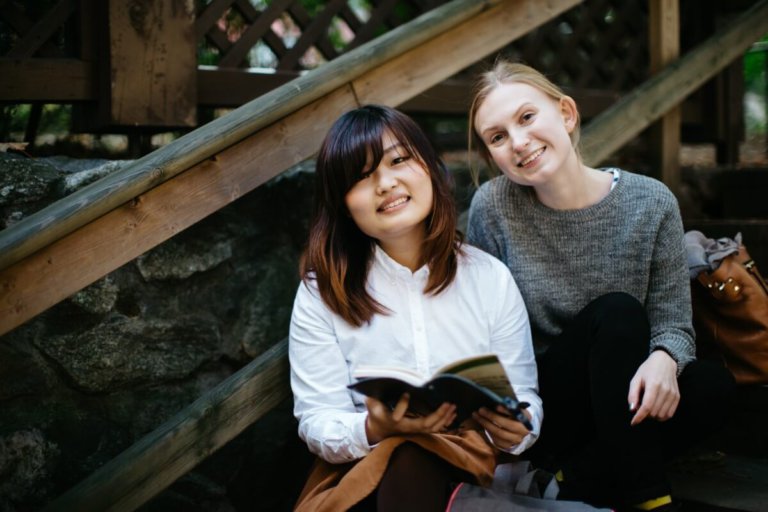
Many students looking to further their studies with a Master’s degree in economics are searching for programmes that teach them how to apply classroom theories in real-world contexts.
Add in hopes of using these newly acquired skills in a fast-paced international setting, and the average graduate student is looking for a lot more than just textbooks.
At the Stockholm School of Economics, they can learn under notable researchers like Martina Björkman Nyqvist and Abhijeet Singh. Recently, both faculty members received a 350,000 euro research grant to study and evaluate social inclusion among new immigrants arriving in Sweden.
Their work is based on evaluating a programme founded and implemented by the organisation Kompis Sverige – which translates roughly to Buddy Sweden.
Since 2013, Kompis Sverige has been working to promote social and economic integration of new immigrants. It matches immigrants with established Swedes, opening doors to new friendships to be forged between them. More importantly, it creates strong ties that might be difficult to achieve otherwise.
It’s the first of its kind in the country to use randomised controlled trials, which is the evaluation methodology used in the research that was awarded Nobel Memorial Prize in Economic Sciences 2019.
Martina Björkman Nyqvist said, “By evaluating the project through randomised controlled trials, we will be able to rigorously study the effect of the program on how well it works for social inclusion.”
“It’s wonderful to be given the opportunity to use this particular method to evaluate a policy project in Sweden. We hope to see more evaluations of this kind in Sweden in the future.”
Having lecturers involved in research projects of this calibre signals one thing: They are under the tutelage of some of the most innovative minds in Europe.
SSE is well-known for cutting-edge research projects like these where Master’s students can learn firsthand how to apply their economics learning to real-world applications.
SSE’s Department of Economics head David Domeij explains how SSE structures this real-world approach to studying economics: “This is accomplished through a structured learning environment where a solid theoretical understanding is acquired during the first part of the programme, and where a practically oriented problem-solving ability is the focus of the second part of the programme.”
Finding your niche in economics through innovative course offerings
Martina Björkman Nyqvist and Abhijeet Singh both teach the MSc in Economics programme at SSE, where students can specialise in either two tracks: One in Applied Economic Analysis or another in International Economics.
Analytical thinking, and theoretical and empirical problem-solving skills, which can then be applied to sundry matters, issues, and real-world problems, are some of the skills acquired by students who specialise in Applied Economic Analysis.

Stockholm School of Economics – Photographer: Juliana Wiklund
As for the International Economics specialisation, students learn how to apply economic theory to solve complex problems as well as develop a critical understanding of current issues in global economics.
In either track, students are taught by experienced professors where they engage in discussions revolving around relevant and hot issues in economics. They receive the latest industry knowledge, allowing them to leave SSE as competitive graduates.
Constantin Plox, a student from Germany currently in the midst of an MSc in Economics programme at Stockholm School of Economics, summed up the course succinctly:
“Economics is not just a really good degree for later job opportunities, but it’s also a great way to understand the world and find answers to really big questions.”
“What I think is great about doing this programme is getting a general overview of economics and a general skillset, and then being able to really specialise.”
Putting an emphasis on the programme’s problem-solving skills elements, graduates can apply the logic in a wide variety of settings.
Students are taught both modern economic analysis and quantitative empirical methods, which they can then use to analyse complex real-world problems in public policymaking, both in private business as well as international organisations.
With cutting-edge research and the practical application of Economics, SSE has found itself being lauded as one of Europe’s leading graduate programmes.
When students graduate, they’re not only highly employable, but they are ready to help organisations tackle the difficult issues affecting the world with their degree.
Mara Balassa, another SSE student enrolled in the MSc Economics programme, originally from Romania explained, “We all know that SSE is highly-ranked in the league tables, so for me that was a really important factor – for an institution that is doing cutting-edge research and that is preparing us for what’s to come after our Master’s.”
Follow the Stockholm School of Economics on Facebook, Twitter, YouTube, Instagram and LinkedIn
Liked this? Then you’ll love…
Stockholm School of Economics: A cut above the rest
Gain international business insights in the heart of the Nordics







